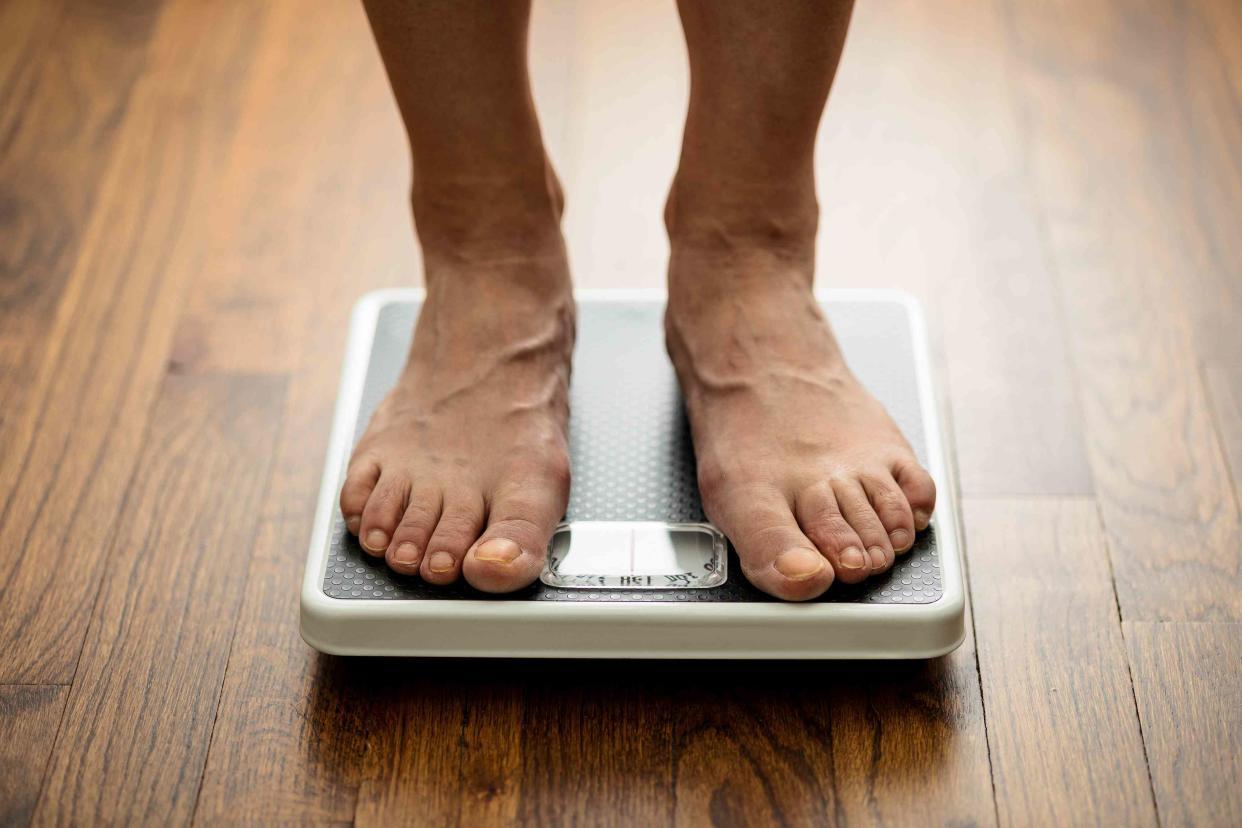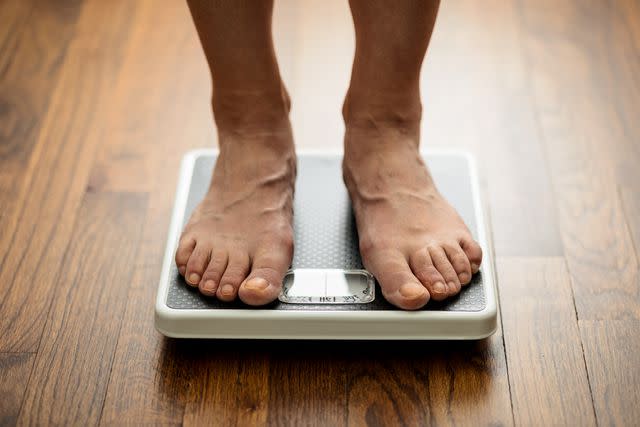What Is Thyroid Disease?

OsakaWayne Studios / Getty Images
Medically reviewed by Do-Eun Lee, MD
The thyroid is a butterfly-shaped gland located at the front of the base of the neck. It is part of the endocrine system and releases hormones that affect metabolism, brain development, and bone maintenance.
When the thyroid over- or underproduces vital hormones, it can lead to a host of different health issues because of how the body relies on these hormones for various functions.
This article discusses types of thyroid disease, their associated symptoms, and what treatment options are available.

OsakaWayne Studios / Getty Images
Types of Thyroid Disease
There are several types of thyroid disease, each of which impacts the production of vital hormones that lead to hypo- and hyperthyroidism.
Types of thyroid disease include:
Hyperthyroidism: When the thyroid produces hormones in excess
Hypothyroidism: When the thyroid does not produce enough hormones
Hashimoto’s thyroiditis: An autoimmune disorder that causes the thyroid gland to become inflamed, leading to hypothyroidism and swelling (goiter)
Graves’ disease: An autoimmune disorder that leads to hyperthyroidism
Thyroid tumors: Noncancerous growths, such as nodules or adenomas, that grow from the lining of the thyroid gland and can release excess thyroid hormones
Thyroid cancer: Cancer of the thyroid
Postpartum thyroiditis: Thyroid inflammation following the birth of a child
Certain thyroid diseases can be cured, such as thyroid cancer. However, in some cases, a person can restore their thyroid to proper functioning levels with medication, but they may be required to take it regularly to maintain thyroid function.
Related:Thyroid Disease Facts and Statistics: What You Need to Know
Thyroid Disease Symptoms
Symptoms will vary depending on whether your thyroid creates too much or too little of the hormones the body needs. The general symptoms of hypothyroidism include:
Fatigue
Intolerance to cold temperatures
Weight gain
Digestive issues such as constipation
Dry skin
Voice changes
The symptoms associated with hyperthyroidism are:
Fatigue
Tremors
Anxiety
Sleep disturbances
Weight loss
Intolerance to hot temperatures
Sweating
Excessive thirst (polydipsia)
A person with thyroid disease may not immediately experience all the symptoms mentioned above. The first signs of thyroid disease that should prompt a visit to a healthcare provider include:
Fatigue
Weight gain or loss without diet or exercise changes
A slowed or increased heart rate
Increased sensitivity to temperature
Learn More:Hyperthyroidism vs. Hypothyroidism: Differences and Symptoms
In Women
Women are far more likely to develop thyroid disease than men, which can lead to health consequences affecting their menstrual periods and fertility. The symptoms of thyroid disease may also mimic menopause.
The signs in women can differ depending on whether their thyroid is making too many or too few hormones. However, symptoms that affect sexual health can occur during both hypo- and hyperthyroidism.
Hypothyroidism
Increased sensitivity to cold
Constipation
Muscle weakness
Weight gain without increasing calorie intake
Muscle and joint pain
Low mood and increased feelings of depression or sadness
Extreme tiredness
Pale and dry skin
Dry and thinning hair
A slower heart rate than usual
Less sweating than usual
Puffiness in the face
Hoarse voice
Heavier menstrual periods
Increased bad cholesterol
Changes to sex drive (libido)
Pain during sexual intercourse
Impaired ability to become aroused
Hyperthyroidism
Increased sensitivity to heat
An increase in the number of bowel movements per day or diarrhea
Weight loss
An increase in appetite with a higher caloric intake
Increased feelings of anxiety or nervousness
Irritability
Sleep disturbances
Trembling in the hands and fingers
An irregular or rapid heartbeat or feeling as though your heart is pounding in your chest
Muscle weakness
Eye changes, including irritation, redness, or eye bulging
Missed or fewer menstrual periods with lighter bleeding
Sweating more than usual
Changes to sex drive (libido)
Pain during sexual intercourse
Impaired ability to become aroused
Learn More:Fertility and Pregnancy Challenges With Thyroid Disease
In Men
Thyroid disease is less common in men. That said, they experience the typical symptoms of hypo- or hyperthyroidism mentioned above if it does develop.
Often, thyroid disease can negatively affect men’s sex hormones. When that happens, it can lead to symptoms such as:
A rapid increase in hair loss
Reduced sex drive
A decrease in muscle strength and mass
Male breast enlargement (gynecomastia)
Difficulty reaching ejaculation
Shrinking testicles
Infertility
A reduced sperm count or quality
An increased risk for hip and spine fractures
Both hypo- and hyperthyroidism can cause secondary complications, including:
Blood clots
Stroke
Heart failure
Osteoporosis (thinning bones from loss of bone mass and bone mineral density)
Infertility
High cholesterol
Myxedema coma (life-threatening slowing of the body’s functions)
Abnormal Thyroid Levels: What Does the Thyroid Control?
The thyroid produces the following three hormones, each of which play a role in several bodily processes:
Triiodothyronine (T3)
Tetraiodothyronine (Thyroxine OR T4)
Calcitonin
The T3 and T4 hormones increase the body’s metabolic rate, which is how energy is used within the body. This action helps the body utilize food as energy, regulate weight, ensure proper growth and development in children, and improve cognitive function by activating the nervous system.
These hormones are also crucial for the following processes:
Blood pressure regulation
Heart rate regulation
How the body uses other hormones
Transporting proteins throughout the blood to where they need to be in the body
Calcitonin plays a role in bone metabolism, which is the rate at which bones break down and are rebuilt.
Thyroid Disease Causes
There are several causes associated with thyroid disease and hypo- and hyperthyroidism.
Some causes of hypothyroidism include:
Hashimoto’s disease, an autoimmune disorder that attacks the thyroid
Inflammation of the thyroid (thyroiditis)
When all or part of the thyroid is surgically removed
Some medications, such as heart, bipolar disorder, and cancer medicines
Pituitary gland disorders because this gland plays a role in the health of the thyroid
Causes of hyperthyroidism include:
Graves' disease
Overactive thyroid nodules
Thyroiditis
Too much iodine in the body
Using too much thyroid hormone medication
Noncancerous tumors of the pituitary gland
There are several risk factors associated with the development of thyroid disease, including:
Family history or personal history of previous thyroid disease
Radiation treatment of the thyroid, neck, or chest
Being over the age of 60
Other health conditions or disorders such as B12 deficiency, type 1 or 2 diabetes, primary adrenal insufficiency (hormone disorder), and Turner syndrome
Having too much iodine in the diet
Using medications with iodine
Smoking
Recent pregnancy (within six months)
Having post-traumatic stress disorder (PTSD)
Read Next:10 Ways to Reduce Your Risk of Thyroid Disease
Testing for Thyroid Disease
Early on in thyroid disease, the symptoms are so general that it can be challenging to determine if you're experiencing thyroid problems or something else. To get an accurate diagnosis, healthcare providers use blood tests to measure the levels of thyroid and thyroid-stimulating hormones.
Other diagnostic tools may be used, such as:
Radioactive iodine uptake test: This involves drinking radioactive iodine liquid or taking capsules to detect how much of the substance collects in the thyroid. High levels mean hyperthyroidism, while low mean hypothyroidism.
Thyroid scan: The radioactive iodine used in the uptake test is also used for a thyroid scan. The scan determines how much or how little the thyroid absorbs of the substance.
Thyroid ultrasound: This test is used if thyroid nodules are suspected or were found on a thyroid scan. The ultrasound can provide a better look at their size and shape.
Thyroid fine needle biopsy: To look for abnormal cells in the thyroid, a fine needle is inserted into a numbed area of the neck and into the thyroid to collect a sample.
Can You Check Your Thyroid Yourself?
While it’s not possible to check your thyroid for excess hormone production at home, you can perform an exam on yourself to see if there are any abnormal masses or lumps in the neck that may be contributing to the problem.
Gather a handheld mirror and a glass of water. To perform the examination yourself, you will:
Hold the mirror in front of you, focusing on your neck above the collarbones but below your voice box.
Tip your head backward while still maintaining focus on the mirror.
Take a drink of water and watch your neck as you swallow to look for abnormal bulges in the area.
Thyroid Disease Treatment
There are several treatment options available for people with thyroid disease. Therapies include medications and natural treatments. Healthcare providers will want to alleviate the symptoms while restoring thyroid hormone levels. If there are growths or nodules, reducing their size will also be a part of the treatment plan.
The therapies a healthcare provider chooses will depend on the person’s needs and whether they have hypo- or hyperthyroidism. Medications for hypothyroidism increase the production of thyroid hormones to help correct the underproducing gland. They include:
Levothyroxine
Liothyronine
Desiccated thyroid extract (DTE)
Medications for hyperthyroidism have the opposite effect and aim to reduce thyroid hormones. Options include:
Tapazole (methimazole)
Propylthiouracil (PTU)
Inderal, a beta-blocker that reduces symptoms rather than restoring proper thyroid levels
Radioactive iodine
Dexamethasone or prednisone in case of thyroiditis
Sometimes, a combination of medicines will be used for the best possible results. A common combinational approach utilizes liothyronine (a synthetic T3) alongside levothyroxine, iodine, and selenium. It is important to note that taking selenium may cause an overcorrection, leading to hyperthyroidism in some rare cases.
Learn More:Medications Used to Treat Thyroid Disease
Natural treatments for hypo- or hyperthyroidism can help restore the thyroid gland's proper function. Sometimes, hypothyroidism and its symptoms can be helped with proper supplementation. For example, since iodine deficiency can lead to an underactive thyroid, supplementing with trace minerals may aid in restoring adequate levels of thyroid hormones.
Other possible alternative treatments for hypothyroidism include:
Ashwagandha root
The avoidance of food products that contain high levels of iodine, such as kelp and seaweed
Aloe barbadensis Miller juice (ABMJ) from the aloe plant
Acupuncture
Research has shown that for hyperthyroidism, some possible effective natural remedies include:
Royal jelly (honey bee secretions)
Green barley grass
Taraxaf (a combination of olive leaves, curcumin, nettle leaves, and dandelion)
Selenium (a mineral)
Acupuncture
Managing your stress levels during treatment, regardless of whether you have hypo- or hyperthyroidism, is vital because the stress hormone cortisol can interfere with the function of the thyroid, leading to worsened symptoms. Some stress management techniques include:
Exercises such as yoga, Pilates, or walking
Meditation and mindfulness
Cognitive behavioral therapy (CBT), a form of talk therapy
Tai chi
Art therapy
Treating thyroid disease is crucial because, without it, the condition can lead to other, possibly severe health complications, including cardiovascular disease or central nervous system and peripheral nerve damage.
When thyroid disease causes eye swelling, it can be challenging to cope with the symptom. However, there are ways to combat it at home, such as:
Elevating your head while you sleep
Taking selenium supplements (for mild swelling)
Speaking to a healthcare provider about possible inflammation-hindering medications, such as corticosteroids or immunosuppressants
Learn More:Nutrition Tips for Thyroid Patients
Outlook for Thyroid Disease
Thyroid disease is a highly treatable condition. While it is not always severe, it can be if left untreated for too long. With a wide array of therapies available, the best thing a person can do for their thyroid disorder is to speak to a healthcare provider at the first sign of symptoms.
It will be easier to treat the faster you seek treatment. Since some complications associated with untreated thyroid disease are severe, it's always better to seek diagnosis and treatment early on.

